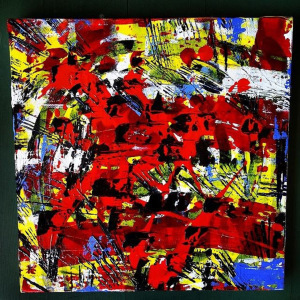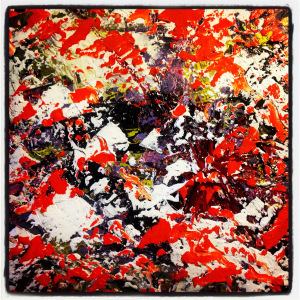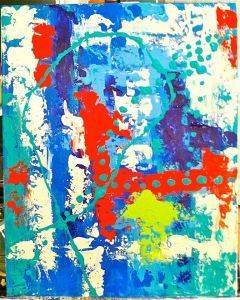Jim Palmer's Blog, page 30
May 29, 2014
Jim Palmer Online Art Auction (Friday 7pm CST)
Many of you know that I do spiritual direction and counseling with folks who are in crisis, and do not have the financial means to seek out this kind of support. The situations I am currently involved in include a person who is breaking free from a domestic violence scenario, and another who is separating themselves from an abusive religious cult. I am usually working with four or five people in this capacity. On Friday night I am going to be having a Facebook Auction with four of my original abstract art pieces, which are acrylic paintings on canvas. Two of them are 14×18, and two are 10×10. There is also one 16×20 piece donated by artist Donna Willis Kinnaird. I posted pics of the auction pieces below. The auction will begin at 7pm CST on Friday night, and close at 7pm CST Saturday. I plan on posting each picture separately for the auction. Friends can make bids in the comment section or if you wish to remain anonymous you can place a silent bid through a FB message. It’s a joy to share my art, and the auction will enable me to continue supporting those who come to me in crisis. Thanks :)


May 27, 2014
Marilyn Manson, the Zombie Apocalypse, and why being saved won’t save you
Whether you are relatively new to my blog or been following it for years, below is a menu of several posts of interest that I have gathered together and linked below.
1. Seeing Jesus in new ways, outside the box of religion:
The difference between religion and Jesus
Jesus cannot be defined in terms of religion, not even the Christian one
Why getting saved won’t change you
2. Questions related to shedding religion
From Christian to Atheist (and other good questions)
Solving the dilemma of “Christians” and “non-Christians”
Are you a Gnostic, and is that bad?
Dear Jim, why am I still screwed up?
Letters from leavers (what people are sharing from the front-lines of shedding religion)
Is it okay to be sick? Do I lack the faith to be healed?
Is institutional Christianity the Stockholm Syndrome?
Depression is not a spiritual problem
14 Factors that influence what one comes up with in the Bible
3 things religious leaders say to scare and control you
The three most misinterpreted words in the Bible
The false notion of being born again
3. Spiritual reconstruction and rebuilding
What “spiritual” is… is up to you
20 ways to deepen your spirituality
16 things people report about their shedding religion journey
Making peace with your religious past
20 really good ideas, whatever you believe about God
4. Special topics
Spirituality and Mental Illness
5. Jim’s books
Divine Nobodies: Shedding Religion to Find God (and the unlikely people who help you)
Wide Open Spaces: Beyond Paint-by-Number Christianity
Being Jesus in Nashville: Finding the Courage to Live Your Life (whoever and wherever you are)
Notes from (Over) the Edge: Unmasking the Truth to End your Suffering


May 26, 2014
Solving the dilemma of “Christians” and “non-Christians”
“Dear Jim,
I’ve got this problem. How do you balance and live in the tension of relationships with fellow Christians, and yet being focused on non-Christians?
Sincerely, Tired Tony”
***
Dear Tired Tony,
I’m thinking you might have become a victim fo the “us” and “them” mentality, in this case, “Christian” and “non-Christian.” You might be surprised to learn that such labels were rarely if ever used in the Bible. Even the label “Christian” was originally born out of a derogatory reference people used to identify Christ followers, making fun of how they imitated Jesus.
Tony, who really is a “Christian?” Is it someone who has all the proper “Christian” theological answers? And who’s to say what those are exactly? I’m sure you’ve noticed that there are many different interpretations of the scriptures, each person claiming their view is correct. But even if someone could claim having correct Christian theology, what if that person’s life didn’t resemble anything like the life Jesus lived? Would that person be a “Christian?” And what about a person with an intellectual or learning disability? Can they be a “Christian?” Is a “Christian” someone who prayed the “Jesus prayer”? And what if their motivation for doing so was to make their girlfriend happy?
And Tony, who is the “non-Christian?” As far as i know, every human being deep down desires the abundant life Jesus spoke of – a life of love, peace, freedom, and contentment. Also, every human being (consciously or unconsciously) is seeking that life one way or another. Tony, have you arrived yet in living that life? How far do you or anyone have to go before you jump out of one label into the other? Does it change moment by moment – you live in alignment with the spiritual teachings of Jesus and you are a “Christian,” you live out of sync with Jesus’ spiritual teachings and you are a “non-Christian?”
Tony, try this. See every human being as a living, breathing image, reflection, or expression of God. Keep in mind that every person you know or meet desires what you desire, and, like you, is seeking them the best way they know how. People also fear the same things you do, Tony. You’d be surprised by how much alike we all really are at the deepest level. Assume that every person has learned something valuable on their journey that you could benefit from. Whoever it is, focus your energies on affirming and encouraging the truth you see in other people. Forget about trying to find the right label to pin on them. Instead, desire love, peace, well-being, and freedom for every person. Have compassion on every person you meet, and be a tangible expression of God’s love as you go. By doing this, you are living in the way Jesus lived.
What Tony, are you going to relate differently to people based on whatever label you suppose is right for them? Did Jesus do this? Did he treat the people labeled as “sinners” as less than other people? Tony, while you’re at it you might as well drop all your other human labels by which you judge people. Instead, just go with this: every person is 100% human; every person is 100% and equally created as an expression of the image, likeness, and being of God; every person is 100% loved and accepted by God; and every person is equally 100% invited to embrace the spiritual abundance that Jesus lived and offered. We are all here to help each other shed the obstacles that are hindering us, and to live the truth together.
Hope this helps.
Jim


“Jim, you must not be a Christian.”
“Jim, you must no longer be a Christian. Do you even believe in Jesus?”
“Joe, the significance I place upon Jesus for myself is exponentially greater that any time moment of my life, including the days when I was the Senior Pastor of a thriving Christian church. I do believe in Jesus, but not the traditions of men that were established in his name.”
*
Contrary to popular belief Jesus did NOT:
Start the Christian religion
See human beings as “sinners”
Die in order to rescue people from God
Establish a spiritual hierarchy of “clergy” and “laity”
Create a theological orthodoxy about God
Write or read the New Testament
Advocate the hatred, diminshment or maltreatment of another human being for any reason
Teach that women were subservient to men
Deny the image of God in any human being
Believe that humankind was separated from God
I wrote two posts to clarify the ways Jesus is often misrepresented by the religion that bears his name:


May 23, 2014
“Jim, do you pray?”
“Jim, what does “intercessory prayer” look like for you? Where does it fit in or does it?”
*
“I no longer subscribe to many of the premises that are associated with the idea of intercessory prayer, at least as I learned it. In a nutshell, I learned intercessory prayer as a request for divine intervention on behalf of another person. It’s asking God to intervene in a person’s circumstances, and to provide whatever is necessary to resolve their difficulty or dilemma. Intercessory prayer is often a request for God to intervene in another person’s life in the form of providing healing, guidance, strength, courage, wisdom, change of circumstances, protection, financial “blessing,” etc.
Intercessory prayer seems to operate on a model that involves three separate parties: the intercessor; God; and the person being prayed for. The idea is that the intercessor appeals to God, and God in turn intervenes accordingly, and the life of the person being prayed for is affected by God’s action.
In my view, dividing it out this way is reinforcing the falsehood of separation. A visual representation of this intercessory prayer idea might be something like this: the intercessor is sitting at home, God is up in the sky like a divine satellite dish, and the person in need is wherever they happen to be. The intercessor’s prayer goes up and pings the divine satellite. In response, the divine satellite turns toward the person in need and their particular situation, and miraculously supplies what was requested.
This model of intercessory prayer imagines a kind of separation that isn’t real. The intercessor, God, and the person being prayed for are not separate in the way this model implies. Further, the model assumes that the person who is being prayed for is separated from what they need or desire, namely peace, freedom, well-being, love, courage, guidance, strength, wisdom, etc. The model also implies that the answer or resolution to their circumstances or difficulty lies outside of their own ability to act or the possibilities present in the situation itself.
In some instances “intercessory prayer” can be magical thinking or encourage a lack of personal responsibility, if the situation involves a person who is not taking responsibility for their lives or not responding to situations as they require, and instead hoping or expecting God to miraculously swoop in and bail them out.
My way of approaching “intercessory prayer” involves the following. I accept the interrelatedness and interconnectedness of all things including God, of which I am a part. My desire for the liberation of all beings and humankind has been growing and intensifying over the years. As I walk and live along the everyday paths of life, I am mindful of wanting to think, do or be what aids the liberation of all beings. I accept that my own way of seeing and being in the world affects the whole, and impacts all humankind. So in this case, “intercessory prayer” for me is accepting that I am not separate from God or separate from peace, love, freedom, well-being, courage, wisdom, etc. I also accept that one of the most spiritual acts that I contribute to the whole is to take responsibility for my own life, address the root cause of my suffering, and learning to live skillfully by responding to the situations of my life as they require.
Intercessory prayer for me is also a willingness to involve myself in tangible ways to encourage, support, assist, and help those around me that I see in need, whether the person is my neighbor or someone on the other side of the world. Rather than tell someone “I’ll pray for you,” I consider what it might mean for me to be part of the answer through my own love, compassion, support, assistance, and generosity. For me, sometimes “intercessory prayer” is holding a deep and persistent desire for the liberation of another person, and the end of their suffering.
I think there are many different ways that people connect with God or the divine on behalf of the well-being of others. All that I’ve shared is simply how it has been evolving for me. I don’t think this is the prescribed way; this is just how things are working themselves out for me at this point with respect to intercessory prayer.”


May 22, 2014
How do you unlearn something? I pondered this on YouTube today.
Are you a Gnostic, and is that bad?
“Jim, I was accused of being “gnostic,” and was told I should be careful because I am treading in very dangerous territory. Can you help me understand this?”
*
“I put this accusation in the following category: Things people say to discredit and scare you of your path because it threatens their security, which is attached to their belief system.
The word “gnostic” has been twisted around by religious people to have the connotation of something dangerous, sinister, evil or demonic. The accusation of being “gnostic” is meant to induce you with fear to dissuade you from the path you are on. This is the most common tactic of people who want to control you… fear.
First off, the word “gnosis” is the Greek word for “knowledge” or “wisdom.” Most commonly the word is used to refer to “spiritual knowledge.”
Those who want to scare you off your path will speak of “Gnosticism” as some sort of diabolical “hidden knowledge” that violates the truth of Jesus. Because we all know that anything that could be described as a “hidden” or “secret” knowledge must be akin to some dangerous spell concocted in Hogwarts School of Witchcraft and Wizardry!
There are at least four main reasons why the idea of a hidden inner knowledge threatens some religious people:
1. People outsource, externalize or defer their spiritual authority to a religious system.
2. People have been made to mistrust what is inside themselves.
3. People idolize the powers of the mind.
4. People misunderstand how spiritual truth is known.
Here are a few things to ponder…
There is a way that all spiritual knowledge is hidden. Think of Jesus’ illustration of the wide and narrow road. The truth is simple, but it’s difficult because of our own preferences. Most people don’t want to know the truth, they want to be comfortable. It is often the case that the path of truth is very discomforting to the things we think we already know, and therefore it is a road less traveled.
Remember that old Burger King motto – “have it your way”? It is often the unspoken motto of our spiritual journey and pursuit of truth. We want to know the truth on our terms. We have conditions like:
a. It has to nicely fit in, complement, and support our current beliefs and understandings.
b. It must provide a sense of certainty and security.
c. It must not disturb our lives too much so as to to make us uncomfortable, or push us too far out of our comfort zone.
I wrote an entire section in Notes from (over) the Edge about how the truth is known. Not what it is, but how to find it.
Think also of Jesus’ primary message and teaching: “Repent for the Kingdom of God has come.” The word “repent” does NOT mean to be sorry for past wrongs. The Greek word for “repent” is “metanoia,” which means to transform the way you typically understand or process reality. It means to get out of the machinations of your mind, and allow yourself to see things in a way you have never allowed yourself to see before. In other words, Jesus said that God’s kingdom of peace, wholeness, freedom, and well-being is present in every moment, but you won’t find it in the ways you are accustomed to finding things.
I wrote in Notes from (Over) the Edge:
“Your original Self operates with a different mode of knowing than your body and mind. Your original Self has a direct and immediate awareness of the way things really are. We experience this awareness as an intuitive knowing, tacit understanding, or an implicit awareness.
This kind of intuitive knowing goes like this:
I know it
I don’t know why I know it
I know it as more certain than anything I am certain of
It is inexpressible
This way of knowing is how God, Truth, your original Self, and the Nature of all things are known. It’s an entirely different way than the mental processes of the brain. You don’t attain this knowledge. This way of knowing is knit into the essence of your original Self, and your original Self sees the world through this awareness in every moment.”
Truth or the nature of reality is perceptible through intuitive knowing, and tacit understanding or tacit knowledge. This is the “gnosis” we all need.”


May 21, 2014
Dear, Jim: Why am I still screwed up?
“Jim, I seem to know the truth. But why am I still screwed up?”
*
“I want to make a distinction here. No person has a spiritual problem. Every person is screwed up.
First, no person truly has a “spiritual problem.” Your true Self is one with God. That Self is an extension, expression or manifestation of all that we mean by using the word “God.” Your true Self is whole and complete. Your true Self has never, is never, and will never be separated from God. Your true Self cannot be improved or diminished. This is the fundamental fact that is never threatened. There is nothing for you to improve, change, attain, earn, achieve, or acquire spiritually. You have NO spiritual problem. What trips you up in your human journey is falsely thinking you have a spiritual problem. All human suffering, in one way or another, is rooted in the ignorance or denial of who we are.
Secondly, we are all screwed up. Right now the person who is reading this post (you) is a mash-up of a lifetime of circumstances, situations, people, relationships, experiences, choices, and numerous elements we had no control over. Our humanity is affected and shaped by all these factors. One person deals with depression, another has Bipolar Disorder, another has codependency, some have an addiction, others have ways of thinking about themselves that are self-defeating, etc… We are all “screwed up” in some way. None of us are left unscathed on life’s journey. Join the club.
You don’t have a “spiritual problem” but it requires courage and determination to wed the truth to your particular human situation. Each of us has personal work to do in order to address our particular human “screwed-upness.” Knowing your true Self and the truth of all things is not a substitute for doing your personal work, and skillfully responding to your human situation as it requires.
If your car breaks down, no amount of spiritual enlightenment is going to fix it. Knowing your true Self and the truth of all things will likely influence the degree to which the car situation rattles your equilibrium, but it’s still not going to fix the car. Fixing the car is a mechanical issue, and responding to the situation as it requires would require taking the car to a mechanic. Likewise, if you have depression, codependency, self-hatred, addiction, a mental disorder, etc., though spiritual enlightenment will transform your relationship to the issue itself, you still must respond as the situation requires… whatever that means or entails. In other words, spiritual enlightenment can transform your relationship to your alcoholism, but you still have to determine the proper personal work (i.e. 12 Step Program) to properly address the dynamics of Alcoholism.
Know and embrace the truth of your Self and all things, AND do your personal work as the situation requires.
Remember that you are never alone in two ways. First, you are a permanent card-carrying member of the “No Spiritual Problem Club.” Secondly, you AND every human being has their personal work to do in addressing their human “screwed-upness.”


May 20, 2014
I’m launching a YouTube Channel
I had a momentary lapse in judgment, and decided to launch a YouTube Channel. :) I plan to start posting videos tomorrow. If you’re interested in subscribing, click this link.
There’s no telling what you’re gonna get one video to the next. I’m quite eccentric, and eclectic in my interests. It may be entertaining… in a weird sort of way. I receive lots of emails/messages with questions from folks who are shedding religion, and some videos will be digging into these questions. If you do subscribe, leave a comment and say hi in the “Discussion” section on the page. Thanks!


May 19, 2014
Don’t make the world wrong
This world is characterized by impermanence. All things in this human realm have a beginning, change, and have an end. The weather changes, our health changes, our thoughts and feelings come and go, relationships change, circumstances change, our beliefs and views change, our finances change, etc. Our unhappiness is a result of the mistaken notion that the source of true peace, freedom, and well-being is properly arranging the dynamics of our human situation. We cling to the way things are in this moment, and then suffer when they change as they always do.
This world is characterized by impermanence and no amount of God, spirituality, or enlightenment is going to change this. This is the way the human realm is supposed to be. The world and our human journey is not bad or wrong because of this, but it does require one to live mindfully of one Self, the one Life behind it all, and the true fundamental reality of all things. That fact that the world is characterized by impermanence should not be viewed negatively. Because the world is ever impermanent, it is an ever-creative world, and we have the opportunity and responsibility of creating it.




















